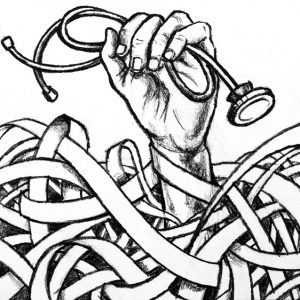Open Letter to Peacehealth St. Joseph Cancer Center
by Robert A. Duke
Greetings, Cancer Center Board of Directors:
Is there a sadder comment on cancer care than “I wish someone had told me?” That was my wish in 2009 about my wife’s glioblastoma treatment and was the despairing 2018 wish of a current cancer patient and caregiver we’ll call the Courts.
As Mrs. Court related it to me, her husband’s experience at Bellingham’s St. Joseph Hospital Cancer Center was as though she were reading from my 2014 book “Waking Up Dying: Caregiving When There Is No Tomorrow.” I wrote and published the book about my wife’s and my obstacles in getting care and treatment from the Cancer Center nearly a decade ago. The Court’s story was indeed sadder, because her story was, “Little has changed.”
When my wife, Shearlean Duke, was diagnosed with terminal brain cancer, the only advice from her primary care physician was to seek brain surgery. She wasn’t referred to the Cancer Center. The local brain surgeon she consulted made no referral to the Cancer Center. After her craniotomy at University of Washington Medical Center, she was referred to a radiologist at the Cancer Center without explanation or discussion of further care and treatment. The Cancer Center radiologist had no clue how to get medication required to start radiation treatment, which the referring U.W. brain specialist had failed to prescribe.
And this was during just the first two weeks of her treatment. Things got no better over the succeeding 18 months, and it now appears little has changed over the past 108 months.
Isn’t it time to do something?
This anonymous couple, the Courts, and I think so, but what to do? We recommend opening the door to alternatives. There may be problems and flaws with some alternatives, but they are minor compared to the problems and flaws of the established healthcare system on display at the Cancer Center. Problems and flaws can be managed, controlled and mitigated.
There are obvious answers, which we will get to, but waiting another nine years is unacceptable and indefensible.
We recommend that every newly diagnosed patient and caregiver be immediately referred to the Cancer Center for a treatment and care orientation, at which all available resources are identified, explained, discussed and offered. When treatment of lung cancer patients was being delayed, nurse-navigators were assigned to expedite treatment to get patients into care earlier. Having navigators for everyone is said to be unaffordable, but there are numerous experienced caregivers who have lost their patients to death and remain willing to volunteer. There is literature about cancer care ranging from books to brochures, and there are charitable organizations offering free treatment referral services.
For example:
Caregivers
Currently, experienced caregivers are discarded as detailed in my Whatcom Watch essay, “Refuge for Discarded Caregivers,” December 2017. They are a squandered resource. Experienced caregivers, such as me and numerous discarded others, are available to volunteer our time and experience.
Organizations
Chris Elliott Fund’s (CEF) Direct Connect Program at endbraincancer.org is available free to brain cancer patients and caregivers to connect them with treatment and care services. This organization existed when Shearlean and today’s patient was diagnosed, but neither was informed of it. CEF receives 7,000 inquiries per month, but it is unknown how many of those originate from the Cancer Center.
Literature
My book, “Waking Up Dying: Caregiving When There Is No Tomorrow,” was published in 2014 and was about how to navigate brain cancer treatment and care on your own, unassisted, in Bellingham and Washington State. Donation of his book was offered for the Cancer Center patient library, but was banned by the Cancer Center. See the story by Bob Schober for the July 2014 issue of Whatcom Watch.
Caregiver Mrs. Court is a highly educated and sophisticated psychotherapist used to dealing with complex problems and difficult issues. “I rarely give in to personal anger,” she said, but she’s had to give up on dealing with the healthcare system — insurers, clinics, and cancer specialists, she said. One of her husband’s oncologists disappeared suddenly, in mid-treatment, without warning or explanation, and eventually health insurance referral complications overwhelmed her.
Fortunately, this patient continues to do well and remains ambulatory since his diagnosis. The Courts are now beneficiaries of CEF’s Direct Connect Program and are considering clinical trial opportunities for further treatment.
What if Shearlean or Mr. Court had been referred to the Cancer Center at diagnosis, would it have changed their outcomes? I believe not, because the Cancer Center the Courts and I know is unwilling, disorganized or incapable of providing the needed patient or caregiver support. Treating cancer is not an issue – it never was – supporting patients and caregivers was and remains the issue demanding change.
_____________________________
Robert A. Duke is author of “Waking Up Dying: Caregiving When There Is No Tomorrow,” he lives in Bellingham. His email: boshduke@gmail.com

